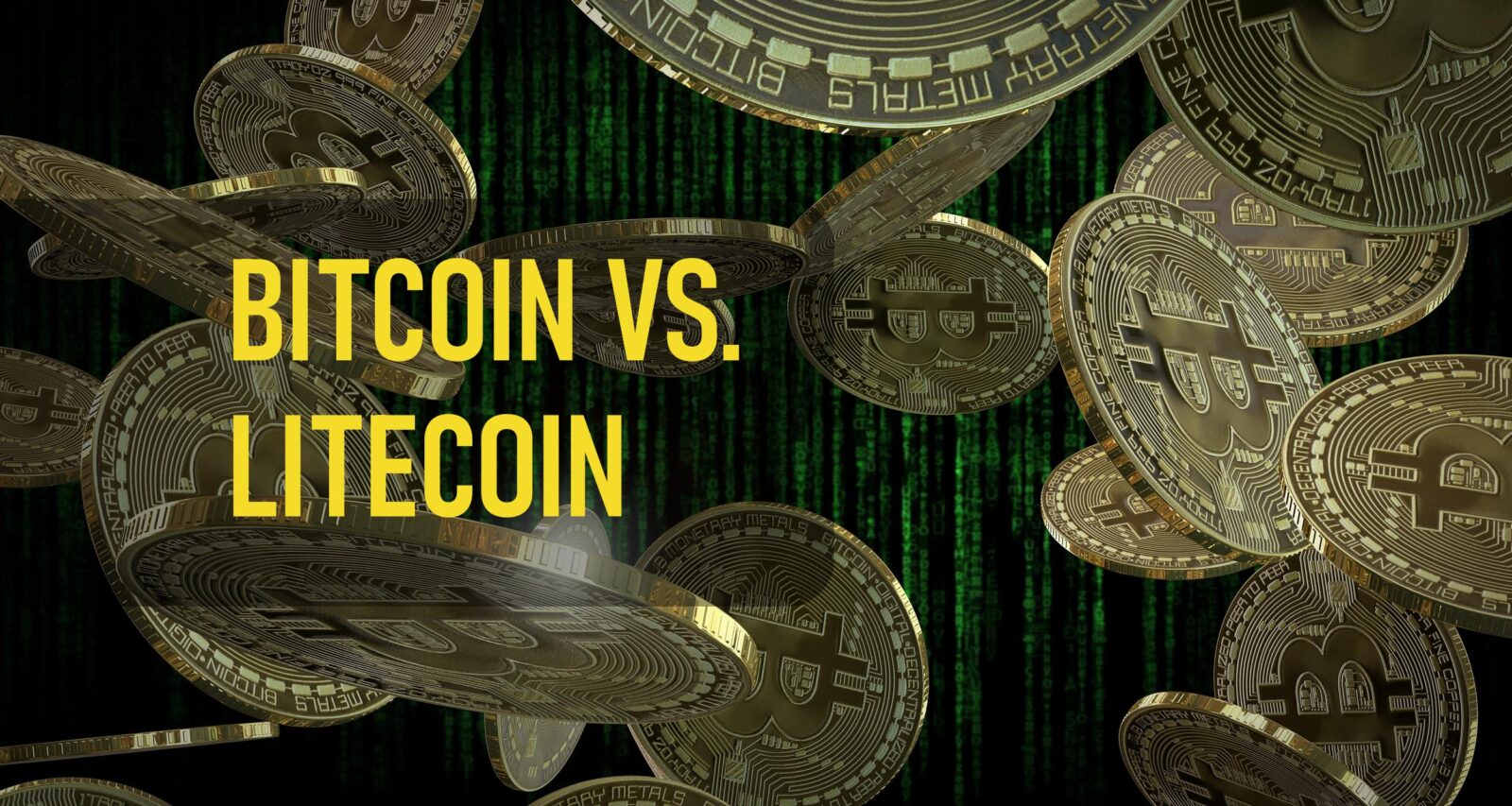When it comes to cryptocurrencies, Bitcoin (BTC) is the undisputed leader, known for pioneering the decentralized digital currency movement. However, many other cryptocurrencies have been developed since Bitcoin’s creation in 2009, each with its own unique characteristics and advantages. One of the most notable of these is Litecoin (LTC), often referred to as “the silver to Bitcoin’s gold.”
In this article, we’ll explore the key differences between Bitcoin and Litecoin, how they compare in terms of speed, security, use cases, and whether Litecoin is a better option for specific purposes or simply an alternative to Bitcoin.
Overview of Bitcoin
Bitcoin was created by the pseudonymous developer Satoshi Nakamoto and launched in 2009. As the first cryptocurrency, it set the foundation for decentralized digital assets by operating on a blockchain—a public ledger where all transactions are securely recorded.
Key Features of Bitcoin:
- Decentralization: Bitcoin operates without a central authority, making it immune to government interference or manipulation.
- Scarcity: Bitcoin has a maximum supply of 21 million coins, creating a deflationary system.
- Security: Bitcoin’s blockchain is secured by a proof-of-work consensus mechanism, relying on miners to verify and secure transactions.
- Store of Value: Bitcoin has established itself as a “digital gold,” widely regarded as a store of value and a hedge against inflation.
- Widespread Adoption: Bitcoin has the largest market cap and is recognized globally by both institutional and retail investors.
Overview of Litecoin
Litecoin was created by Charlie Lee in 2011 as a “lite” version of Bitcoin. It was designed to improve upon Bitcoin’s shortcomings by offering faster transaction speeds and lower fees. Litecoin is based on the Bitcoin protocol but has been modified to enhance transaction processing.
Key Features of Litecoin:
- Faster Block Generation: Litecoin generates blocks every 2.5 minutes, compared to Bitcoin’s 10 minutes, allowing for faster transaction processing.
- Larger Supply: Litecoin has a maximum supply of 84 million coins, which is four times that of Bitcoin’s total supply.
- Lower Fees: Litecoin transactions typically come with lower fees compared to Bitcoin, making it more suitable for everyday transactions.
- Scrypt Algorithm: Litecoin uses a different proof-of-work algorithm (Scrypt) than Bitcoin (SHA-256), designed to make mining more accessible to a wider range of people.
- Silver to Bitcoin’s Gold: Litecoin is often referred to as a complement to Bitcoin, rather than a competitor, due to its similar structure but different use case.
Bitcoin vs. Litecoin: A Comparison
| Feature | Bitcoin (BTC) | Litecoin (LTC) |
|---|---|---|
| Creation Year | 2009 | 2011 |
| Max Supply | 21 million coins | 84 million coins |
| Block Time | 10 minutes | 2.5 minutes |
| Transaction Fees | Higher, especially during network congestion | Lower fees, better for smaller transactions |
| Algorithm | SHA-256 (proof-of-work) | Scrypt (proof-of-work) |
| Market Cap | Largest cryptocurrency by market cap | Much smaller compared to Bitcoin |
| Security | Highly secure due to a large mining network | Secure but with a smaller mining network |
| Adoption | Widely accepted as a store of value | Used for faster, smaller transactions |
| Mining Difficulty | High, favoring industrial miners | Easier to mine with consumer hardware |
| Use Case | Digital gold, store of value | Digital silver, ideal for payments and transfers |
| Volatility | High volatility, but more stable than altcoins | High volatility, more prone to price swings |
1. Transaction Speed
- Bitcoin: Bitcoin’s average block time is 10 minutes, meaning that transactions can take 10 minutes or longer to be confirmed. While this is not a major issue for large transactions or long-term holdings, it makes Bitcoin less practical for everyday purchases.
- Litecoin: Litecoin was specifically designed to process transactions faster, with a block time of 2.5 minutes. This faster processing time makes Litecoin more suitable for frequent or smaller transactions, such as buying coffee or making payments in stores.
2. Transaction Fees
- Bitcoin: Bitcoin transaction fees can fluctuate greatly depending on network demand. During periods of high congestion, fees can spike, making small transactions impractical due to the cost of sending BTC.
- Litecoin: Litecoin offers consistently lower transaction fees compared to Bitcoin, even during times of network congestion. This makes it a more practical option for everyday spending, especially for micropayments.
3. Supply and Scarcity
- Bitcoin: Bitcoin’s capped supply of 21 million coins has made it increasingly valuable as a scarce asset. Its deflationary nature is one of the reasons why Bitcoin is referred to as “digital gold.”
- Litecoin: Litecoin has a larger supply of 84 million coins, which makes it four times more abundant than Bitcoin. While this reduces the scarcity compared to Bitcoin, Litecoin’s larger supply is balanced by its lower price and higher transaction speed, making it more suitable as a medium of exchange.
4. Mining Algorithm
- Bitcoin: Bitcoin uses the SHA-256 algorithm for mining, which requires high levels of computing power. As a result, Bitcoin mining is dominated by large mining operations with specialized hardware (ASICs).
- Litecoin: Litecoin uses the Scrypt algorithm, which was originally intended to make mining more accessible to everyday users with consumer-grade hardware. However, ASICs have been developed for Litecoin as well, making mining somewhat more centralized over time, but still more accessible than Bitcoin mining.
5. Market Capitalization and Adoption
- Bitcoin: As the first cryptocurrency, Bitcoin has the largest market cap and is widely regarded as the most valuable and secure cryptocurrency. It has been adopted by major institutions, governments, and retail investors worldwide, and is often used as a hedge against inflation.
- Litecoin: Litecoin’s market cap is significantly smaller than Bitcoin’s, and while it enjoys widespread adoption in the cryptocurrency community, it is not as universally accepted. However, Litecoin is supported by many exchanges, wallets, and merchants as a faster payment alternative to Bitcoin.
6. Use Cases
- Bitcoin: Bitcoin is primarily seen as a store of value and is often referred to as “digital gold.” It is increasingly being used by institutional investors, large corporations, and individuals as a hedge against economic instability and inflation.
- Litecoin: Litecoin is viewed as “digital silver,” and is more commonly used for everyday transactions due to its speed and lower fees. While it doesn’t serve as a store of value to the same degree as Bitcoin, Litecoin is often used as a medium of exchange in situations where quick and inexpensive transactions are needed.
Bitcoin or Litecoin: Which Should You Choose?
When to Choose Bitcoin:
- Long-Term Investment: Bitcoin’s primary use case is as a store of value, similar to gold. If you are looking for an asset to hold for the long term, Bitcoin’s scarcity, security, and widespread adoption make it the better option for preserving wealth.
- Institutional Adoption: Bitcoin has gained significant institutional support and is increasingly being used by large companies and hedge funds. This backing provides Bitcoin with a level of stability and trust that other cryptocurrencies, including Litecoin, do not have.
When to Choose Litecoin:
- Everyday Transactions: If you’re looking for a cryptocurrency to use for daily purchases or peer-to-peer transfers, Litecoin’s faster transaction times and lower fees make it a better choice than Bitcoin for these types of activities.
- Smaller, Faster Payments: Litecoin is more practical for making smaller payments or transferring funds quickly. Its lower fees and quicker confirmation times make it ideal for situations where Bitcoin’s higher fees and slower confirmation times may be inconvenient.
Conclusion: Bitcoin vs. Litecoin
Both Bitcoin and Litecoin offer distinct advantages, and they serve different roles in the cryptocurrency ecosystem. Bitcoin is the better option for long-term investors looking to store value and hedge against inflation, while Litecoin is more suitable for everyday transactions and small payments due to its faster processing times and lower fees.
Ultimately, Bitcoin is seen as a store of value with a higher degree of institutional adoption and security, while Litecoin remains a strong contender as a medium of exchange with practical applications in daily transactions. Depending on your investment goals or usage needs, you may find value in holding both Bitcoin and Litecoin as part of a diversified cryptocurrency portfolio.






Leave a Reply